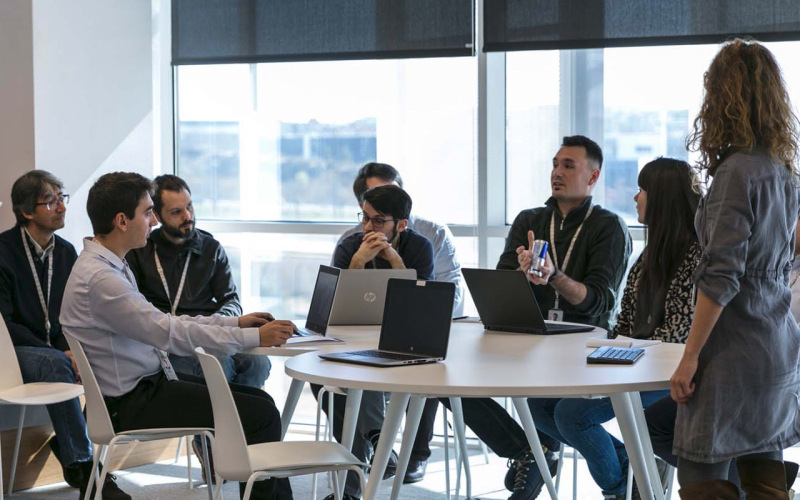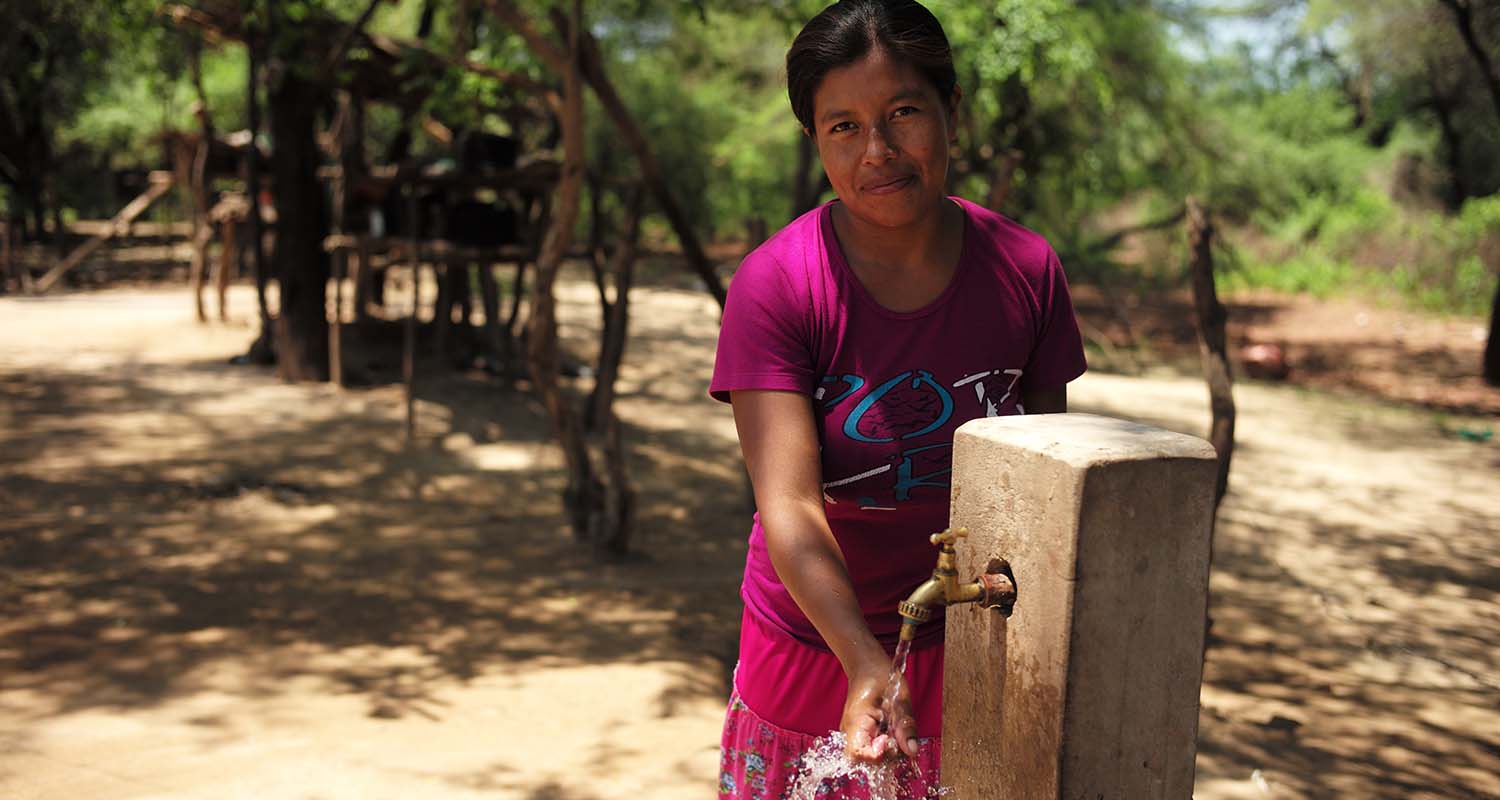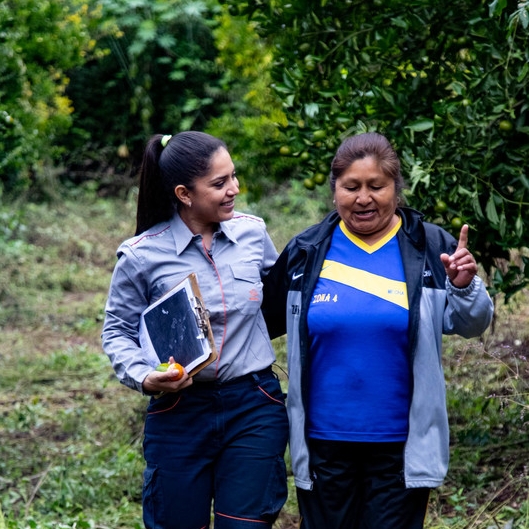Human rights
Human rights
Grievance mechanisms
Grievance mechanisms
The company is committed to remediating adverse impacts in an agreed manner with the affected parties in order to achieve effective and satisfactory remediation.
In case negative impacts are detected, the affected population is identified, the nature and magnitude of the impacts are evaluated using methodologies from international standards, such as the United Nations Guiding Principles on Business and Human Rights, among others, and a resolution is proposed, which is then discussed with affected parties in order to find a satisfactory agreement.
Grievance mechanisms are a valuable source of information that help to detect potential human rights impacts on communities, contractors, partners, customers, and other stakeholders.

The two main functions of these mechanisms are:
- To contribute to identifying any adverse human rights impacts and provide a means for people who are directly affected to raise a concern within an environment of understanding and respect for human rights, without fear of any type of retaliation. Any claims received may arise from our own grievance mechanisms or from any other judicial or extrajudicial means, and at no time are confidentiality provisions required.
- To enable the company to address any adverse impacts and to make any necessary reparations early and directly.
In order to anticipate and manage grievances, concerns, or requests for information, we have structured and accessible mechanisms that guarantee the effectiveness and trust of users in the system. We channel grievances, concerns, doubts, or suggestions through our Ethics and Business Conduct Channel, business or customer channels, or through the operational mechanisms developed at the most local level. In this way, we guarantee the active listening and diligent treatment of any concern, grievance, or complaint.
Moroever, our community liaison officers play a fundamental role in the collection of emerging discrepancies, as they build dialogue and trust by proactively approaching communities in search of their feedback on the impacts that the operation is producing in the environment. Our liaison officers inform the communities about the process and the steps that they need to follow. Every grievance entails a response, and depending on the analysis, the proposed measures can vary from an apology and a declaration acknowledging the impact to financial compensations or other measures to mitigate the impact or risk.
During the execution of the agreed mitigation or remediation measures, they are closely monitored to ensure deadlines are met and progress is reported to stakeholders. In order to do this, grievance mechanisms feature tools to communicate alerts and notifications.
What are these mechanisms?
The mechanisms are designed in collaboration with the potentially affected people according to the United Nations Guiding Principles on Business and Human Rights, which establish that grievance mechanisms must be:
- Legitimate: To build the trust of the stakeholders they are intended for and ensure that the grievance processes are carried out correctly.
- Accessible: To be known to all stakeholder groups they are intended for and provide adequate assistance for those who may have special difficulties accessing them.
- Predictable: To provide a clear and known procedure with an indicative time frame for each stage and clarity on the types of processes and outcomes available as well as the means to monitor implementation.
- Equitable: To ensure that victims have reasonable access to sources of information, advice, and expertise necessary to engage in a grievance process on an equal basis, with full information and respect.
- Transparent: To keep the parties to a grievance process informed about its progress and provide sufficient information on the mechanism's performance to build trust in its effectiveness and safeguard the public interest at stake.
- Compatible with rights: To ensure that the outcomes and reparations are in accordance with internationally recognized human rights.
- A source of continuous learning: To adopt the relevant measures to identify lessons for improving the mechanism and preventing future grievances and damages.
In the context of continuous dialogue with our communities and other stakeholders, preferred methods of communication are identified and the functioning of the grievance mechanism is analyzed. Suggestions from communities and other stakeholders help us identify improvement actions and optimize the mechanism.
How is the process?
From the moment reports and claims are received to when they are closed, the entire process can take at least a month. Nonetheless, this time required could vary depending on the complexity of the issue.
- Identification of grievances and complaints
- Registration, analysis, and classification
- Alerting concerned parties
- Investigation of causes
- Dialogue with the parties placing the claim or complaint
- Analysis with all parties involved
- Generation of options for solving the matter and steps for improvement
- Creation of solutions for the party placing the claim or complaint
- Solution agreement to reach a compromise
- Drafting of report and follow-up
Claims or concerns can be submitted by anyone, internal or external to the company, through different channels:
- Ethics and Business Conduct Channel, managed by an external and independent supplier managed confidentially who escalates claims to the appropriate levels within the company.
- Customer service channels, managed by an independent service.
- Business grievance mechanisms and operational grievance mechanisms, managed by local teams or external consultants who support us on the ground.
Claims are formally registered ensuring the protection of personal data and sensitive information and are classified depending on the nature of the complaint. The personnel that receives the claim determines its degree of severity and transmits the information for its scaling and so that it may be handled at the proper level.
Each grievance is investigated under criteria of confidentiality, independence, and respect for all parties involved, ensuring transparency and preventing possible conflicts of interest.
At the level of operational mechanisms, minor claims are resolved and closed immediately without requiring a thorough investigation whereas more relevant claims are managed at the local level and transferred to the expert team in Human Rights and Community Relations within the Division of Sustainability and if necessary, are then escalated to members of the Executive Committee for their knowledge and possible management.
What can grievance submitters expect from the grievance mechanism?
During the development of the process, the grievance submitter is periodically informed, so that they know the evolution of the claim and the following phases of the procedure.
Once the analysis has been completed, the claimant is notified of a reasoned resolution proposal. This process includes the explanation of the assessed facts, conclusions, and actions taken or planned, which may range from a formal apology to compensatory or remedial measures.
It is proactively sought that the closure of the claims is carried out in a negotiated manner, culminating in an agreement with the affected people. In the event that approval of the proposed resolution is not reached, it will be reviewed by higher levels within the company or the participation of an independent third party will be used.
We ensure participation and representativeness in remediation processes
We provide the means for all rightholders potentially impacted by our operations to participate in the dialogue processes and, specifically, in the design, access, and improvement of grievance mechanisms.
There is technical, financial, or consultancy support available to the communities to ensure proper pre-dialogue training and due representation of all groups, especially taking into account the most vulnerable.
- Sometimes it is necessary for some people to travel to ensure access to remedy, so it may be necessary to provide free transportation to them.
- We seek the effective participation of women in the dialogue processes related to the remedy by offering a temporary childcare service for the care of dependents while the social management activities promoted by the company take place. This helps us to apply a gender approach and ensure adequate representation and participation of women and other vulnerable groups.
- We rely on independent experts to carry out the impact assessment or remedy processes. We seek to create an environment in which people feel comfortable expressing their perceptions about the company's activity.
We promote dialogue and communication
We promote a culture of respect for human rights and continual dialogue that creates an environment of trust for expressing, without the need for confidentiality provisions and without fear of retaliation, any complaint or claim by our employees and the communities around us, including human rights defenders, whose work we respect and take into consideration, and in no way we block or misrepresent any information shared.
This context and the conviction that respect for human rights in all our activities is an indispensable condition to maintain our social license to operate, ensure that our communities do not find themselves compelled to waive their rights to issue a claim and obtain an active hearing and a commitment on our part.
Our commitment governs our action
We undertake our commitment to human rights and lay it out in our codes of conduct, policies, rules of procedure, and framework agreements that govern all our actions.
We encourage strict compliance with our principles among our contractors and partners, and in no case shall a claim or suggestion lead to retaliation of any kind (legal action, firing, or violence). To this end, we include clauses in contracts, carry out social audits, and support them with awareness-raising activities.
Our Human Rights and Community Relations Policy (PDF l 53 KB) specifically outlines a commitment to establish operational-level grievance mechanisms that adapt to each particular activity from the moment it begins and as early on as possible in the planning of the project. Ultimately, the aim is for people directly affected by company operations to be able to raise any potential human rights impacts.
As of today, there is an operational-level grievance mechanism in our operations to handle claims mainly from local communities but also from employees, suppliers, contractors, and other organizations. Such mechanisms are adapted to every context. The implementation of our incident grievance mechanisms follow an extensive process that is based on the following process:
- Establishing operational grievance mechanisms at the local level.
- Supporting the IPIECA methodology.
- Development of a guide on how to efficiently implement grievance mechanisms.
- Implementing mechanisms in the new projects and improving the existing ones based on previous learning.
- Follow-up and control.
The final design of the grievance mechanism depends on the specific characteristics of the communities and groups they are intended for. This is achieved thanks to the information collected since the initial phases of the projects, during the social baseline studies, and in the previous risks and impact assessments, but it extends to the entire life of the assets or projects. The methodology of all these studies and assessments includes direct and two-way communication with stakeholders through participatory dialogue. This facilitates a design adapted to the target population and allows for its continuous improvement over time.
These mechanisms not only allow us to address early and remediate the adverse impacts of our operations, but they are also a valuable source of information to continuously improve our practices and ensure an environment of understanding and respect for human rights.
Updated as of September 2025.

